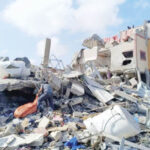Although clear references to the Al-Aqsa Mosque and its environs, i.e. Al-Quds City, were made in the Noble Qur’an and the authentic Sunnah, the city, including the mosque, remained under Byzantine occupation all through the lifetime of the Messenger of Allah (SAW).
The Al-Aqsa is the third of the only three mosques with exceptional holiness in Islam, with the Haramain mosques in Makkah and Madinah being the first and second respectively. Likewise, Al-Quds City, where the mosque is located, is the third of the only three holy cities in Islam.
- Insurgency: IOM, WFP, Korea open centre in Yola to empower IDPs
- Title contenders talk tough at 2021 NTTF championship
Al-Quds was liberated during the era of the second rightly-guided Caliph, Umar ibn Al-Khattab (RA); and it remained a Muslim city for over 400 years before it fell to Christian crusaders due to the accumulated failure of successive Muslim generations over the centuries. Since then and until its current Zionist occupation, control over it had alternated among Muslims, the crusaders and other non-Muslim empires.
The Zionists completed the occupation of Al-Quds, including the Al-Aqsa Mosque, in 1967 during the six-day Arab-Israeli war. By the way, though the Muslim Ummah as a whole had already been on the decline, the fall of Al-Quds to the Zionists represented the lowest extent to which the Ummah could decline.
The defeated largely Arab nationalism-inspired military coalition under the charismatic Egyptian leader, Gamal Abdel Nasser, had deployed its maximum military capabilities amid an unprecedented atmosphere of passionate Arab nationalism across the Arab world.
In the aftermath of the defeat and amid overwhelming shock and sorrow across the Arab and Muslim world, people began to question the efficacy of Arab nationalism as the driving philosophy of the struggle against the Zionist occupation of Al-Quds and the Palestinian territories at large. Besides, with Gamal Abdel Nasser’s acceptance of responsibility for the defeat and his subsequent resignation, sentiments against Arab nationalism as a political philosophy grew further.
In the meantime, there was a growing realisation among Muslims that the loss of Al-Aqsa Mosque and Al-Quds City at large was a lesson divinely meant to chastise the Ummah for its inadequate commitment to its religious obligations. Consequently, there was a gradual but quite noticeable revival in commitment to religiosity in the region and elsewhere in the Muslim world, which would later grow into a phenomenon known as “As-Sahwa”.
However, since then, the struggle for the liberation of Al-Aqsa Mosque, Al-Quds and the entire Palestinian territories has been increasingly entangled in the complexities of global conspiracies, geopolitical tussle and power struggle among the Palestinian elite, which collectively keep the struggle persistently difficult and indeed make it look unachievable for that matter.
Whereas, it is and will indeed remain achievable albeit only when the following interdependent milestones are strictly followed:
Redefining the struggle: All along, the struggle has been wrongly defined. Starting as an “Arab-Israeli conflict”, it shrank into a “Palestinian-Israeli conflict”, and has now ended up as a mere struggle charade between Israel, on the one hand, and various feuding Palestinian factions under their various self-centred political elites, on the other.
For the struggle to be on the course to succeed, it has to be given its real identity, which Islam and nothing but Islam as exclusively contained in Noble Qur’an and the authentic Sunnah according to the perception of the Pious Predecessors. That necessarily makes it a Muslim resistance against the occupation of Al-Aqsa mosque, Al-Quds and the Palestinian land.
Working accordingly: This necessarily involves substantive organizational structures with trustworthy, charismatic, creative and competent minds fully conversant with the underlying dynamics of the crisis and the intricacies of the local, regional and international politics surrounding it, on the one hand, and the details of Islamic jurisprudence as it relates to politics and diplomacy, on the other. They should then embark on reaching out to major relevant local, regional and international players in a respectful, diplomatic yet determined approach while vigorously promoting authentic awareness on the struggle across the Muslim world.
Unity: Of course, the foregoing can only be achieved based on unity and unity of purpose among, at least, the leading political players of the Muslim Ummah. After all, it’s the extent to which the Muslim Ummah is united that determines its ability to not only liberate Al-Quds but reclaim its lost glory as well.
Military power: Appropriate not necessarily superior military power under substantive Muslim governments, not groups, is equally indispensable in the struggle. The collective military capabilities at the disposal of Muslim governments committed to the cause should be formidable enough to represent deterrence against potential aggression. For instance, a collective military power made up of at least several medium-range nuclear weapons, a few thousand medium-range ballistic missiles, a reasonable number of advanced fighter jets, quite sophisticated air and marine defence systems including several warships and submarines, a few million combat-ready soldiers with teams of special forces, advanced intelligence-gathering equipment and networks of highly professional secret agents, is enough to constitute that deterrence.
It is equally enough to put the Muslim negotiators on a par with their counterparts from whatever country, regional or international organisation. After all, regardless of the supposedly civilised world we are in, might is still right; and a country’s influence on the global stage is largely determined by its military might.
Though admittedly that course with its milestone is long and challenging, it remains the only way for the Muslim Ummah to liberate Al-Quds and indeed regain its lost formidability on the global stage.
Until then, the Palestinian cause would continue to be manipulated by selfish and power-hungry Palestinian political elites both the supposed nationalists e.g. the Mahmud Abbas-led Fatah faction, and the purported Islamists, e.g. Hamas and Islamic Jihad.
 Join Daily Trust WhatsApp Community For Quick Access To News and Happenings Around You.
Join Daily Trust WhatsApp Community For Quick Access To News and Happenings Around You.


